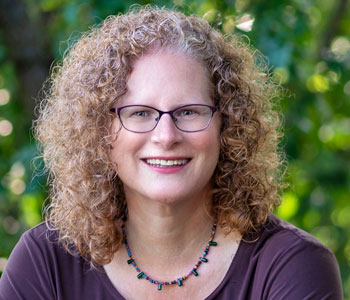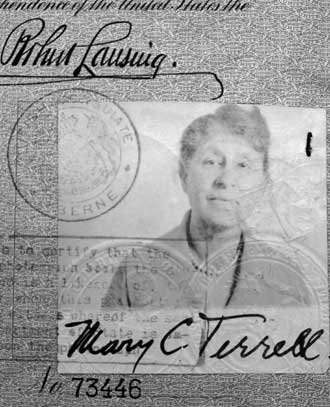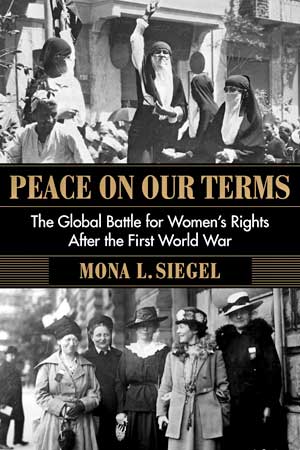
Peace on Our Terms recounts the dramatic story of female activism around the world during a single, remarkable year in history, 1919, when the bloodshed of World War I finally gave way to the long-anticipated but still tenuous peace. Nineteen-nineteen witnessed the collapse of four major continental European and Middle Eastern empires, the first sustained challenge to European colonialism in Asia and Africa, and the emergence of the first standing world government. The year opened ripe with promise, as global statesmen gathered in Paris vowing to bring peace, democracy, and justice to a war-torn world.
Among the many millions listening attentively to the peacemakers’ promises were female suffragists, trade unionists, anti-imperialists, and civil rights activists. Though encouraged by statesmen’s lofty rhetoric, these women were not naïve. They knew that diplomacy was a man’s world. To have a voice in the shaping of the new world order, women were going to have to demand to be heard. Across Europe, North America, the Middle East, and Asia, these women rolled up their sleeves, packed their bags, and crossed oceans and continents, determined to hold global statesmen to their word.
Peace on Our Terms traces the history of these women’s historic actions. It invites readers to enter raucous meeting halls in Paris, Zurich, and Washington, D.C. and to join audacious women marching through the streets of Cairo and Beijing to demand a more just and equitable world.
The women who congregated, spoke, and marched in 1919 brought differing visions of women’s rights and responsibilities to the global stage, but their agendas were all shaped by the monumental expectations for democratic reform, economic justice, and global restructuring generated during the Paris Peace Conference. These pioneering activists shared a common belief that the construction of a just and stable world depended on the inclusion of women in all levels of political decision-making.
Some of these women—like American reformer and future Nobel peace laureate Jane Addams—were already famous in activist circles. Others—like Egyptian nationalist and feminist Huda Shaawari—would gain notoriety in the months that followed. Throughout 1919, they and thousands of like-minded women worldwide cracked open the male-dominated world of diplomacy and policymaking and transformed women’s rights into the global rallying cry that continues to reverberate around the world today.
Nobody truly trains to be a global historian. The field is too vast; the subject matter is impossible to master. I came to this project as a historian of European feminism, pacifism, and internationalism. The history I studied pushed me to broaden my lens and recognize the global nature of women’s fight for equality and justice.
The first organization I studied was the Women’s International League for Peace and Freedom (WILPF). This amazing League—which continues to exist today—was born out of the fires and devastation of the First World War. It grew from the belief that in order for a peaceful world to flourish, women must collaborate fully in its construction. Decades ago, I read with astonishment of the WILPF’s efforts to intervene at the Paris Peace Conference of 1919. I applauded the determination of these pacifist women to put an end to hunger blockades and punitive peace terms, and I marveled at the skill of early League president, Jane Addams, in reconciling women so recently divided by bitter enemy lines.
At the time of this discovery, I assumed that the WILPF Congress of 1919 was a unique attempt by women to intervene in the peace negotiations. This assumption was confirmed by pretty much every history book ever written about the Paris Peace Conference. One scholarly tome after another either ignored women completely or reduced their interventions down to a brief passage or footnote.
Imagine my surprise, then, years later, when I stumbled across a reference to Chinese feminist Soumay Tcheng. Tcheng served as an interpreter to a WILPF delegation that traveled to Asia in the 1920s. The European WILPF members frequently described Tcheng as the first modern woman in China. Curious, I began poking around. Eventually I uncovered Tcheng’s English-language memoir, now out of print and published under her married name, Madame Wei Tao Ming. In the book, Tcheng describes her audacious efforts to secure national sovereignty while serving as an official Chinese delegate to the Paris Peace Conference.
How had I never seen a reference to Tcheng before? And if both Soumay Tcheng and delegates from the WILPF were in Paris in 1919 seeking to participate in the peace negotiations, were there other women who had done the same? My book grew from these questions. It asks: How did female activists from widely different backgrounds seek to contribute to peacemaking and international statecraft at the end of World War I? How did women reconcile competing loyalties to their sex, class, race, religion, and nation as they asserted their voices on the international stage, often for the first time? In what ways did gendered understandings of rights and politics influence their activism? And how did male elites work to contain feminism and defend politics and foreign affairs as a male domain into the postwar world?
It is difficult to crack open this book to a particular page and get a strong sense of the whole. Individual chapters highlight the activism of varying groups of women in different national and international arenas. Initially, many of these women labored in isolation from one another. Over time, though, they would meet. In the aftermath of 1919, as chronicled in the book’s epilogue, most would begin to collaborate as they came to view their own push for gender equity as a part of a broader, global struggle.
 Mary Church Terrell Mary Church Terrell Papers, Library of Congress, Manuscript Division
Mary Church Terrell Mary Church Terrell Papers, Library of Congress, Manuscript Division
A “just-browsing” reader who likes to start at the beginning would make the acquaintance of Marguerite de Witt Schlumberger, a French grandmother who sent five sons to the trenches. Schlumberger organized Western suffragists in Paris to demand that women be seated at the negotiating table. A bit further on, in Chapter 2, a reader’s gaze might by drawn to the 1919 passport photo of Mary Church Terrell, an African American daughter of once-enslaved parents and prominent civil rights activist who came to Paris to champion both racial justice and gender equality. Both she and her college roommate, Ida Gibbs Hunt, were active players in 1919, helping to put pan-Africanism on the ideological map.
The opening lines of Chapter 3 offer an equally enticing introduction to the book. There a reader would encounter Egyptian feminist Huda Shaarawi as she stares down British colonial authorities, daring them to make her a martyr in the fight for Egyptian sovereignty and universal democracy.
Chapter 4 delivers its own share of drama as German feminist Lida Gustava Heymann publicly embraces French feminist Jeanne Mélin. Mélin’s family brickmaking factory was occupied and dismantled by the German army in 1914, and she lived out all four years of the war as a refugee. Her symbolic reconciliation with the “former enemy” would inspire hundreds of pacifist women at the 1919 WILPF Congress in Zurich to stand and take a public oath “to made good the wrongdoings of men.”
It is tempting to recommend opening the book to Chapter 6. There a reader would learn how it is that working women, many born in desperate poverty, managed to convince the nascent International Labor Organization to call for a minimum global standard of twelve weeks paid maternity leave (a standard the United States has yet to meet today).
In the end, however, if I had to send a browsing reader to one place in the book, I think I would point to the middle of Chapter 5. There she or he would meet Soumay Tcheng, the sole woman appointed as an official delegate to the Paris Peace Conference, as she holds the Chinese foreign minister captive at the point of a “rosebush gun” in order to prevent him from signing the Versailles Treaty. To find out if Tcheng was successful or not, the reader would either need to settle in for a long afternoon of browsing or buy the book.

Reading Peace on Our Terms, readers may find themselves justifiably shocked at the contemporary relevance of women’s priorities a century ago. Here in the United States in the early twenty-first century, women’s marches, the #MeToo Movement, and the Equal Rights Amendment are all front-page news, while #BlackLivesMatter and other social justice movements highlight the voices of women of color. Globally, female prime ministers head governments from New Zealand to Finland and from Slovakia to Ethiopia. Since 2010, at the United Nations, UN Women has directed efforts to promote global gender equality and to demand a role for women in peace processes.
If female politicians and peacemakers have never been so visible, myriad problems stemming from gender inequality have proven stubbornly intractable. Violence against women, marriage of under-age girls, sexual discrimination in the workplace, and unequal representation of women in all levels of government continue to sow instability and poverty at home and around the world.
The women featured in Peace on Our Terms fought for women’s full inclusion in peacemaking, nation building, and international policymaking for a reason. They saw it as a necessary precondition to combatting the discrimination and insecurity that had long defined their lives. That battle continues unabated today.
I hope that readers will be inspired by the courageous women’s rights activists in this book. These women—all of them—defied convention and put their reputations, if not their lives, on the line. They did so because they believed that women not only had a right, as individuals, to shape their societies, but they also had a duty, as women, to speak from their unique life experiences. From Malala Yousafzai to Greta Thunberg, we see women around the world continuing that tradition today, often unaware of the shoulders they stand on.
I also expect—perhaps even hope—that some of my readers will step away from this book a bit angry. “How,” they may ask themselves, “can we still be fighting so many of the same battles as these women a century ago?” To ask such a question is to probe the tremendous hurdles women faced in the early twentieth century, as they fought to establish a place for women in international diplomacy and policymaking, and it is a first step toward continuing to fight for a more just and equitable world today.


Mona L. Siegel is a professor of history at California State University, Sacramento. Her first book, The Moral Disarmament of France: Education, Pacifism, and Patriotism, 1914-1940 (Cambridge University Press, 2004) was selected for the 2006 History of Education Society Outstanding Book Award. A recipient of two major grants from the National Endowment for the Humanities, Siegel has authored articles that have appeared in the Washington Post and the New York Times.